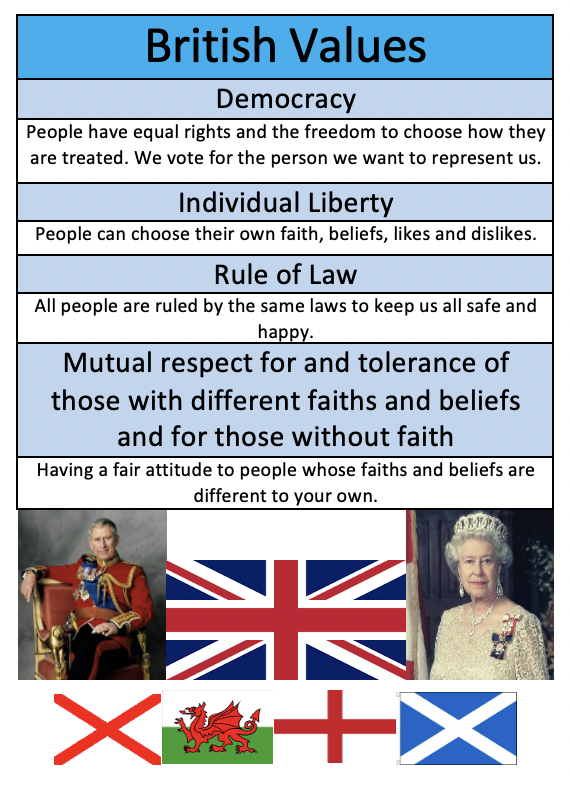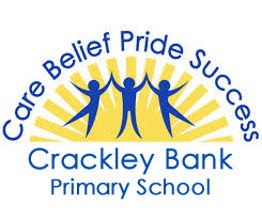British Values

Statement of British Values
Promoting British Values at Crackley Bank Primary School
At Crackley Bank Primary School, we take our responsibility to prepare children for life in modern Britain very seriously. The Department for Education expects all schools to actively promote the fundamental British values of:
- Democracy
- The Rule of Law
- Individual Liberty
- Mutual Respect and Tolerance of those with different faiths and beliefs
These values, first set out in the 2011 Prevent Strategy and reinforced by the Government in 2014, are embedded across our school.
We ensure British Values are introduced, discussed, and lived out through our school ethos, curriculum, and wider opportunities. Our cross-curricular approach provides excellent chances to develop spiritual, moral, social and cultural education, helping children to grow into respectful, responsible citizens.
Children regularly experience opportunities beyond their local community, through visits, visitors, and sporting events, which allow them to understand and celebrate diversity. Their strong, values-based education provides them with a secure foundation for embracing difference.
At Crackley Bank Primary School, children’s voices are valued. We encourage democratic participation through our School and Eco Councils, where members are elected by their peers. Children also take on leadership roles, such as play leaders, supporting younger pupils in games and activities.
We expect all of our children to be positive role models for each other. High expectations for behaviour, responsibility and respect run through all aspects of school life, helping our pupils to develop the confidence and character they need for the future.
Fundamental British Values
Democracy
| Statement | Evidence | Impact |
| The children at Crackley Bank Primary see democracy borne out in a whole variety of ways and see this as being an essential component of successful team working | The establishment of a new School and Eco Council each year models the democratic process Difference and Diversity lessons |
Children are able to work cooperatively in pairs and groups as well as in whole class situations. They understand about turn taking and respecting the views of others. Children in school show respect to others. |
Rule of Law
| Statement | Evidence | Impact |
| The children at Crackley Bank Primary are familiar with this concept through the philosophy that infuses the entire work of the school. They are familiar with the concept through the discussion of values and, in RE lessons, the idea that different religions have guiding principles Children are used to debating and discussing laws/rules and their application. Children are familiar with the local Police who visit to talk to them informally. | Class Rules School Rules/Learning Behaviours School Values lessons on the role of law and parliament School Council meetings Collective Worship | Children are able to articulate how and why we need to behave in school and demonstrate they understand and can abide by these Children all know that they have a right but that with a right comes a responsibility They are able to discuss and debate philosophical issues in relation to these |
Individual Liberty
| Statement | Evidence | Impact |
| Our Values based discussions and acts of worship begin with discussion about the self, e.g. self–respect and self-worth in relation to the individual value so that children see that they are important in their own right. The philosophy of our teaching and learning places emphasis on the right to have our own thoughts and evidence based views Children are strongly encouraged to develop independence in learning and to think for themselves |
Children are able to show independence in learning and to think for themselves | Children understand about the importance of accepting responsibility and of their right to be heard in school They are consulted on many aspects of school life and demonstrate independence of thought and action |
Mutual Respect and the Tolerance of those with different Faiths and Beliefs
| Statement | Evidence | Impact |
| Respect is a fundamental school value, around which pivots much of the work of the school. We pay explicit attention to this as part of our RE, PHSE, and SMSC curriculum Respect is a school value that is discussed deeply, starting with self-respect and covering respect for family, friends, and other groups; the world and its people; and the environment |
Records of Collective Worship RE curriculum RE planning and workbooks |
Children can articulate that respect is a school value and why respect is important; how they show respect to others and how they feel about it for themselves Children’s behaviour demonstrates their good understanding of this value in action Children are able to talk about the different faiths and cultures they learn about, ask questions and show tolerance and respect for others of different faiths and religions |

